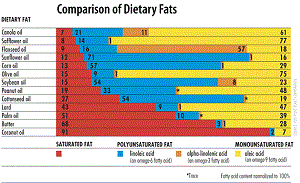Fat Phobia
GOOD FAT / BAD FAT?
Written by Dr. L. Lee Coyne.
 North Americans eat less fat than ever recorded in history and yet we have an obesity epidemic. According to the World Health Organization, obesity is doubling every 5 years and at the current rate everybody in North America will be obese by the year 2230.
North Americans eat less fat than ever recorded in history and yet we have an obesity epidemic. According to the World Health Organization, obesity is doubling every 5 years and at the current rate everybody in North America will be obese by the year 2230.
Fat is a very functional source of energy. It is stored as adipose tissue in times of plenty and metabolized when we need the calories. Insulin is the hormone, known as the storage hormone derived from the "thrifty gene", responsible for most of this storage. It is responsible for transporting surplus carbohydrates and some proteins out of the blood and into the cells where it is stored as glycogen or fat.
It is true that fat goes from your lips to your hips and all over the body very easily. However most do not understand that if your insulin is under control (not elevated), fat is the energy source of choice by a resting or light exercising body. Even when you exercise at 65% of your maximal capacity, 50% of your energy will come from fat, unless you have very high insulin from eating too many sugars.
Good Fats
Misconception: "all fats are bad!"
This is not true. There are some fats that you must eat - called "Essential Fatty Acids" or EFA's - so you can metabolize other fats and produce hormones and immune cells. That is why the American Heart Association's position is that any diet with less than 30% fat is "unproven and potentially dangerous".
We get good fats, sometimes referred to as omega 3 and omega 6 fatty acids from raw nut and seeds, cold pressed oils like flax seed, walnut, pumpkin seed and soybean oils or lecithin (usually derived from the soybean) and cold water fish like salmon and sardines. These are the polyunsaturated fats which can go rancid very quickly and require refrigeration and air tight storage.
Many dietary interferences like low zinc, high cholesterol, alcohol, cheap oils, saturated fats, viral infections, and antibiotics, interfere with the activation of EFA's. Many have to use the "activated" versions known as GLA (gamma linolenic acid, an omega 6 fatty acid) and EPA (eicosapentaenoic acid - an omega 3 fatty acid) for optimal health. Olive and sesame oils are considered high in Mono-unsaturated fats and are considered neutral with some benefits. (Canola oil would require another column to discuss).
Bad Fats
An excessive intake of saturated fats from animal sources and from certain tropical oils have been implicated as contributors to heart disease, obesity, diabetes, cancer and inflammatory diseases.
Unfortunately most the these implications are based on large cross sectional - after the fact - correlation studies and not intervention clinical studies. There is very little discussion about the how and why this occurs. There is some evidence that if saturated fat intake is balanced with EFA's, many of the risk factors like high cholesterol and triglycerides are reduced.
Current advice would suggest you moderate (not eliminate) saturated fat intake but don't get paranoid about it. There are differences in how the body handle certain saturated fats. "Short Chain and Medium Chain" triglycerides like those found in butter can be easily metabolized for energy - particularly if you control your insulin levels through moderate carbohydrate intake. Many saturated fats also carry and store other nutrients like Vitamins A, E & K plus CLA (conjugated linoleic acid which has a host of benefits). So do not treat Saturated fat like it is poison.
Ugly Fats
A group of polyunsaturated fats, exposed to heat, light, oxygen and hydrogen (hydrogenated) become altered in processing and storage. When altered they are know as Trans Fatty Acids.
This group is now considered toxic and is implicated in the causes of cancer, some heart disease and immune system challenges. These nasty fats, found in deep fried fast food, most margarines, anything rancid, processed or packaged can shorten your life. My standard recommendations are to never eat cheap oils, deep fried grease and margarine.
Recommendations
Your diet should be 30% fat divided equally between EFA's, mono-unsaturated and saturated fats. Avoid Trans Fatty Acids like you would an infectious disease.
LeanSeekers
https://leanseekers.com/Articles/Weight-Loss/Fat-Phobia